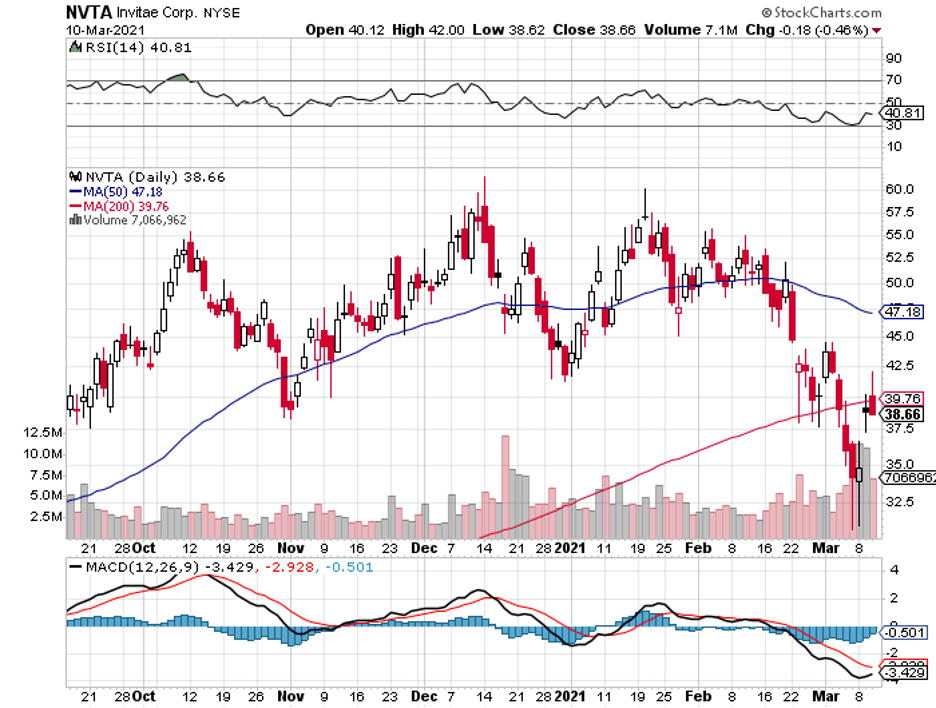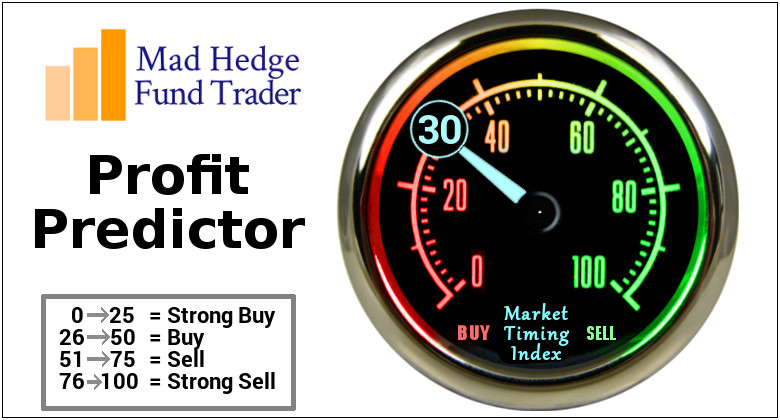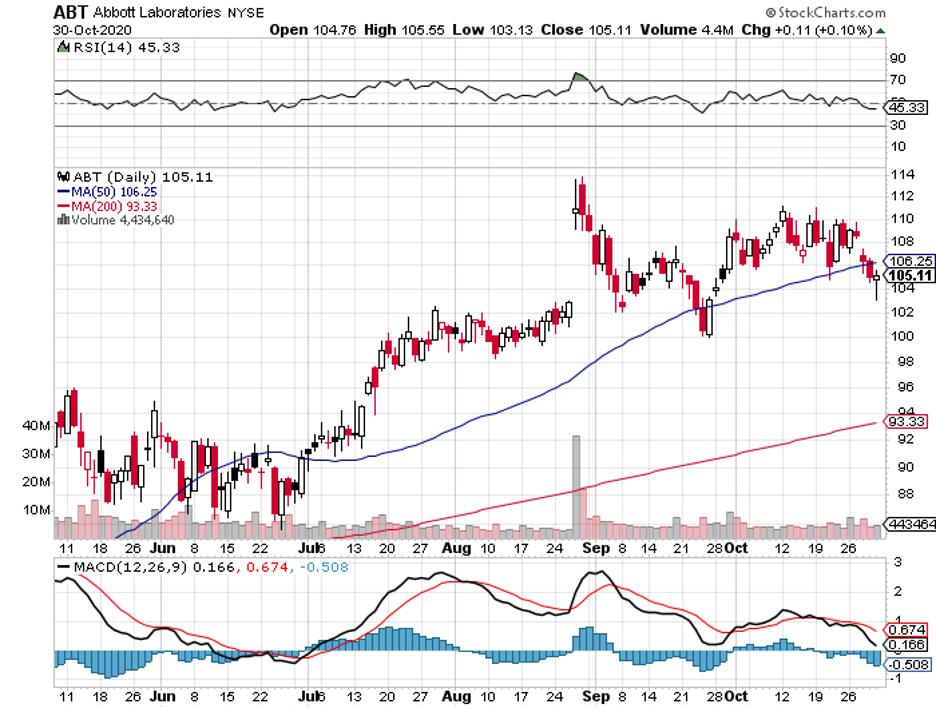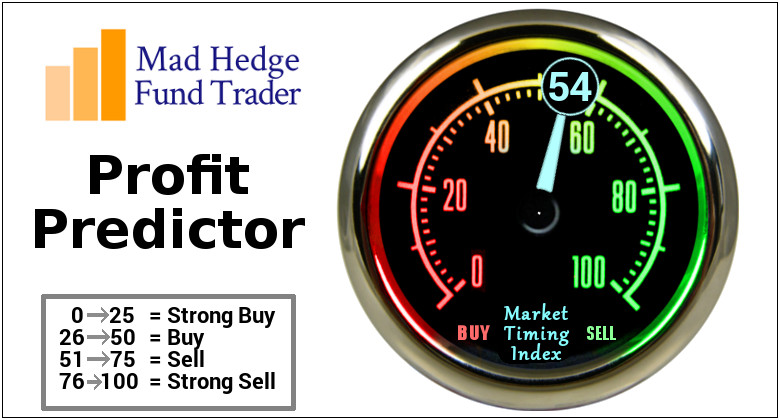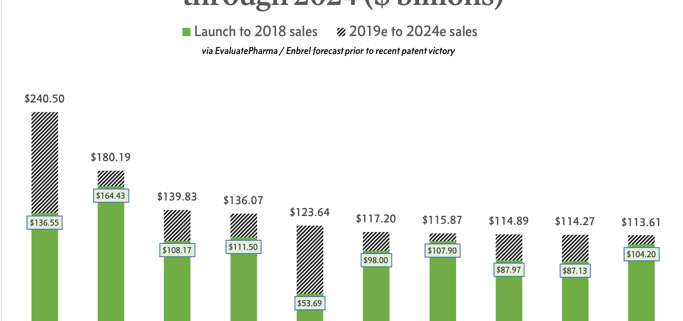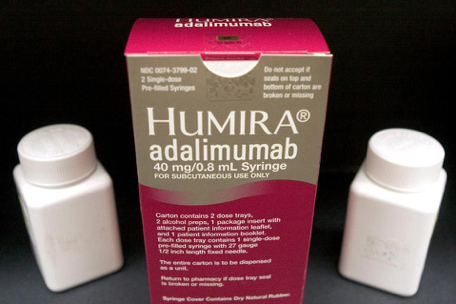Invitae (NVTA) is one of the biggest, albeit erratic, movers in 2020, but only a handful of investors know about the stock.
In March 2020, the stock was trading at $7.43 per share only to shoot to a whopping $61 by mid-December.
A year since then, Invitae stock sits somewhere at $40—a price that could go right up again in the months to come.
Despite the volatility, Invitae continues to generate excitement among its investors.
In fact, Invitae, which has $7.6 billion in market capitalization, is grouped in with bigger healthcare and biotechnology companies like CRISPR Therapeutics (CRSP), valued at $9.36 billion, and Teladoc Health (TDOC), valued at $28.7 billion.
Its potential is even said to match the likes of up-and-coming tech stocks such as Roku (ROKU), Square (SQ), and Shopify (SHOP), which have market capitalizations of $45.7 billion, $103.07 billion, and $134.6 billion, respectively.
Given its growth in the past months and its impressive 226.8% three-year revenue increase, the projections for Invitae look well-grounded.
In fact, I think it’s reasonable to say that Invitae could be the Tesla (TSLA) of the genetic testing industry.
The genetic testing market is estimated to be worth over $21 billion by 2027, growing at a compound annual growth rate of 10% until then.
In 2020, Invitae reported a 29% year-over-year increase in revenue at $279.6 million.
The company also saw a rise in its testing volume by roughly 41% to reach 659,000 billable units—this, despite the headwinds brought about by the COVID-19 pandemic, when the demand for genetic tests took a back seat to make way for COVID-19 diagnostic and other related medical concerns.
Although some of the tests offered by Invitae are covered by insurance carriers, those that are not covered can be availed for as low as $99 for services like noninvasive prenatal screening and $250 for diagnostic, carrier, or proactive testing.
To put things in perspective, people nowadays are more than willing to shell out at least $100 to discover their ancestry, which in most cases is something they already have an idea about.
So, why would these people be reluctant to spend a bit more than $100 to check if they have to take particular precautions to keep themselves safe from diabetes or heart disease?
In the future, Invitae is well-positioned to offer high-quality genetic tests at more affordable prices as well as cater to higher volumes.
One of the most notable moves by Invitae so far is buying ArcherDX for $1.4 billion in cash and stock in October 2020.
This is a telling move for Invitae in terms of its plans for the future.
ArcherDX is another genetic testing company, which specializes in oncology.\
Specifically, ArcherDX focuses on personalized cancer monitoring as well as liquid and tissue biopsy analysis.
Simply put, ArcherDX specializes in developing tests that determine the most suitable drugs to use for cancer treatments.
To date, there’s already a growing number of competition in the genetic testing market, making Invitae’s acquisition of ArcherDX is a smart move.
Most of them are bigger companies like Roche (RHHBY) with a market cap of $269.57 billion, Illumina (ILMN) with $58.28 billion, Abbott (ABT) with $205.28 billion, and Quest Diagnostics (DGX) $15.6 billion.
Invitae, which only has a market capitalization of $7.6 billion, is considered as one of the minor players.
With the addition of ArcherDX in its portfolio, Invitae’s growth could be fast-tracked as the combined companies could ramp up sales on top of queuing additional genetic tests in their current lineup.
Invitae’s shares have jumped by almost 100% in 2020 but saw an over 25% fall last month. Although it has yet to turn a profit since its creation in 2013, Invitae remains an attractive investment thanks to its top-line growth.
Digging into their numbers, Invitae has actually managed to cut down on its cash burn by roughly $20 million from the first quarter of 2020 through the last quarter, excluding the ArcherDX deal.
That’s a notable improvement for a company and indicative of its capacity to veer towards the right direction.
Invitae has a very strong cash position at the moment, with a massive equity offering just last January. Right now, the company’s stockpile is nearly $800 million, which could carry them for quite some time.
Looking at its path of profitability, the company is also projected to be on track for a 50% to 60% growth in the next few years.
For 2021, Invitae is looking at over $450 million in annual revenue, which is 61% higher than 2020.
At this point, Invitae offers an attractive purchasing opportunity for those who want to get in on the industry before it explodes.

